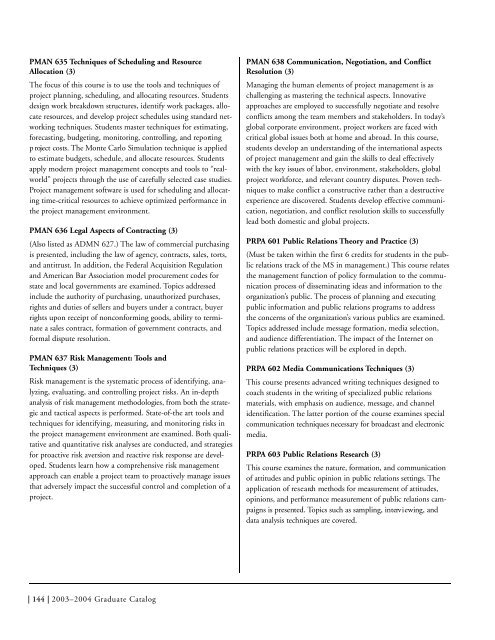A+B. Intro_SJ.1 - University of Maryland University College
A+B. Intro_SJ.1 - University of Maryland University College
A+B. Intro_SJ.1 - University of Maryland University College
You also want an ePaper? Increase the reach of your titles
YUMPU automatically turns print PDFs into web optimized ePapers that Google loves.
PMAN 635 Techniques <strong>of</strong> Scheduling and Resource<br />
Allocation (3)<br />
The focus <strong>of</strong> this course is to use the tools and techniques <strong>of</strong><br />
project planning, scheduling, and allocating resources. Students<br />
design work breakdown structures, identify work packages, allocate<br />
resources, and develop project schedules using standard networking<br />
techniques. Students master techniques for estimating,<br />
forecasting, budgeting, monitoring, controlling, and re p o rt i n g<br />
p roject costs. The Monte Carlo Simulation technique is applied<br />
to estimate budgets, schedule, and allocate resources. Students<br />
apply modern project management concepts and tools to “realworld”<br />
projects through the use <strong>of</strong> carefully selected case studies.<br />
Project management s<strong>of</strong>tware is used for scheduling and allocating<br />
time-critical resources to achieve optimized performance in<br />
the project management environment.<br />
PMAN 636 Legal Aspects <strong>of</strong> Contracting (3)<br />
(Also listed as ADMN 627.) The law <strong>of</strong> commercial purchasing<br />
is presented, including the law <strong>of</strong> agency, contracts, sales, torts,<br />
and antitrust. In addition, the Federal Acquisition Regulation<br />
and American Bar Association model procurement codes for<br />
state and local governments are examined. Topics addressed<br />
include the authority <strong>of</strong> purchasing, unauthorized purchases,<br />
rights and duties <strong>of</strong> sellers and buyers under a contract, buyer<br />
rights upon receipt <strong>of</strong> nonconforming goods, ability to terminate<br />
a sales contract, formation <strong>of</strong> government contracts, and<br />
formal dispute resolution.<br />
PMAN 637 Risk Management: Tools and<br />
Techniques (3)<br />
Risk management is the systematic process <strong>of</strong> identifying, analyzing,<br />
evaluating, and controlling project risks. An in-depth<br />
analysis <strong>of</strong> risk management methodologies, from both the strategic<br />
and tactical aspects is performed. State-<strong>of</strong>-the art tools and<br />
techniques for identifying, measuring, and monitoring risks in<br />
the project management environment are examined. Both qualitative<br />
and quantitative risk analyses are conducted, and strategies<br />
for proactive risk aversion and reactive risk response are developed.<br />
Students learn how a comprehensive risk management<br />
approach can enable a project team to proactively manage issues<br />
that adversely impact the successful control and completion <strong>of</strong> a<br />
project.<br />
PMAN 638 Communication, Negotiation, and Conflict<br />
Resolution (3)<br />
Managing the human elements <strong>of</strong> project management is as<br />
challenging as mastering the technical aspects. Innovative<br />
approaches are employed to successfully negotiate and resolve<br />
conflicts among the team members and stakeholders. In today’s<br />
global corporate environment, project workers are faced with<br />
critical global issues both at home and abroad. In this course,<br />
students develop an understanding <strong>of</strong> the international aspects<br />
<strong>of</strong> project management and gain the skills to deal effectively<br />
with the key issues <strong>of</strong> labor, environment, stakeholders, global<br />
project workforce, and relevant country disputes. Proven techniques<br />
to make conflict a constructive rather than a destructive<br />
experience are discovered. Students develop effective communication,<br />
negotiation, and conflict resolution skills to successfully<br />
lead both domestic and global projects.<br />
PRPA 601 Public Relations Theory and Practice (3)<br />
(Must be taken within the first 6 credits for students in the public<br />
relations track <strong>of</strong> the MS in management.) This course relates<br />
the management function <strong>of</strong> policy formulation to the communication<br />
process <strong>of</strong> disseminating ideas and information to the<br />
organization’s public. The process <strong>of</strong> planning and executing<br />
public information and public relations programs to address<br />
the concerns <strong>of</strong> the organization’s various publics are examined.<br />
Topics addressed include message formation, media selection,<br />
and audience differentiation. The impact <strong>of</strong> the Internet on<br />
public relations practices will be explored in depth.<br />
PRPA 602 Media Communications Techniques (3)<br />
This course presents advanced writing techniques designed to<br />
coach students in the writing <strong>of</strong> specialized public relations<br />
materials, with emphasis on audience, message, and channel<br />
identification. The latter portion <strong>of</strong> the course examines special<br />
communication techniques necessary for broadcast and electro n i c<br />
media.<br />
PRPA 603 Public Relations Research (3)<br />
This course examines the nature, formation, and communication<br />
<strong>of</strong> attitudes and public opinion in public relations settings. T h e<br />
application <strong>of</strong> re s e a rch methods for measurement <strong>of</strong> attitudes,<br />
opinions, and performance measurement <strong>of</strong> public relations campaigns<br />
is presented. Topics such as sampling, interv i ewing, and<br />
data analysis techniques are cove re d .<br />
| 144 | 2003–2004 Graduate Catalog

















